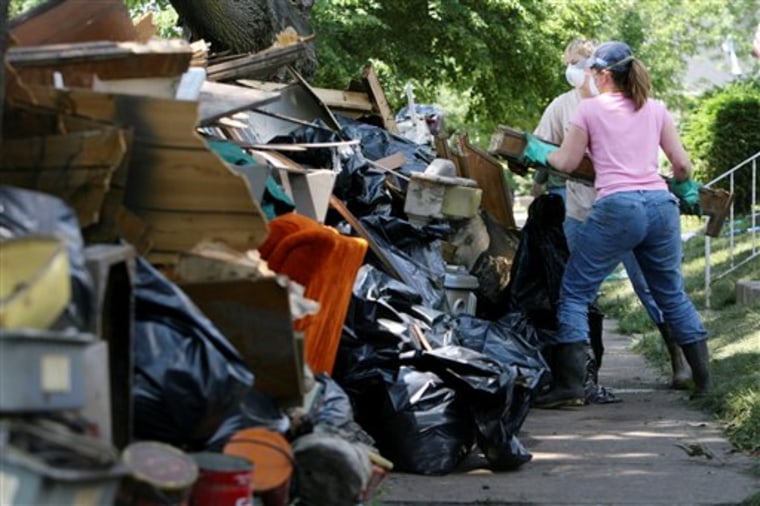President Bush, surveying the aftermath of devastating floods during a lightning-quick tour of the Midwest on Thursday, assured residents and rescuers alike that he is listening to their concerns and understands their exhaustion.
"Obviously, to the extent we can help immediately, we will help," said Bush, still mindful of criticism that the government reacted slowly to Hurricane Katrina three years ago.
"You'll come back better," the president said while being briefed by state and local officials at a cinderblock emergency operations center set up at a community college here, part of a three-hour tour. "Sometimes it's hard to see it."
FEMA Administrator R. David Paulison said FEMA had learned lessons from the 2005 Hurricane Katrina disaster. More than 3.3 million liters of water, 200,000 ready-to-eat meals and 4,000 rolls of plastic sheeting have been distributed, he said. The agency also is placing stocks of sandbags and other supplies in states or towns where flooding hasn’t hit yet or material has not been requested, just to be ready.
"Another lesson learned from Katrina," he said.
Paulison said 28,000 people have registered for federal assistance. The average response time at FEMA’s 24-hour call line is 12 seconds — compared to response times that sometimes took hours during Katrina, he said.
Bush's visit
Bush was in Europe when tornadoes hit and heavy rains sent rivers surging over their banks, killing at least 24 people, the majority in Iowa. Flooding forced tens of thousands across six states to flee their homes and washed out millions of acres of prime farm and grazing lands. He made a point to try to show his deep concern while overseas and traveled to Iowa just two days after returning.
"I really don't have much of an opinion of his coming," said Lashawn Baker, 33, whose family was just starting to clean her flooded home in a southwest Cedar Rapids neighborhood. "It took him a long time to get to New Orleans and he didn't help any of those people, so I don't think he's going to do anything to help Cedar Rapids now that he's here."
Cedar Rapids was submerged in a dirty lake when the Cedar River crested almost 20 feet above flood stage. Now, with the floodwaters having receded, trash was everywhere and businesses and families were trying to determine what could be salvaged.
In Iowa City, a college town about 30 miles to the southeast, the damage was more limited when the Iowa River topped its banks.
Danger still present
But in Missouri and Illinois along the Mississippi River, the danger was still present — not past.
The river tore through a levee late Wednesday at Winfield, about 50 miles north of St. Louis. A second levee still protected most of the town of 720 residents, but residents were urged to evacuate.
In the 150-resident village of Hamburg, Ill., also north of St. Louis, there was no levee to hold back the Mississippi, and Mayor Jim Fortner said about 50 prisoners were helping dozens of volunteers hastily add 2 to 3 feet to a half-mile wall of sandbags. The river, expected to continue rising, already had swamped the town's busiest street and significantly damaged seven homes.
"We have the resources and materials, but we need more people," Fortner said.
Another levee break earlier this week at Meyer, Ill., meanwhile, meant lower river levels for some towns downriver — Quincy, Ill., and Canton and Hannibal in Missouri — but only temporarily. The river was expected to rise again in all places on Friday.
The flooding wasn't expected to be quite as bad in St. Louis, but it was forcing the relocation of several upcoming festivals.
Sen. John McCain of Arizona, the presumed Republican nominee for president, was also visiting Iowa Thursday in a tour separate from Bush’s. His opponent, Democratic Sen. Barack Obama of Illinois, helped fill sandbags over the weekend in Quincy, Ill.
Mold patrols upriver
Among the piles of trash in Cedar Rapids, many residents sported rubber boots. The American Red Cross handed out thousands of cleanup kits with gloves, mops, scrub brushes and disinfectant. Workers also gave out pamphlets with safe cleaning instructions.
"We all know mold comes along with these floodwaters and that can be a serious issue, so we ask people to take the proper precautions and take care of themselves as they are cleaning up," said Jennifer Pickar, spokeswoman for the American Red Cross in Cedar Rapids.
Trash collection in the city was scheduled to proceed as normal, and officials waived some fees for garbage pickup and debris drop-off at the area landfill, where sandbags could be left for free. Flood victims were told to separate items into piles such as appliances, scrap metal, wood debris and hazardous waste, including paint products, weed killer and cleaners.
Along the city’s street corners, the distinctions weren’t apparent.
"We can plan for disasters, but obviously this is beyond the magnitude of anything these agencies have planned for,” said Darrin Gage, a planner with the Cedar Rapids-Linn County Solid Waste Agency.
Laundry owner Dave Tallett said dump trucks have been making extra trips for all the trash, but they’re not coming fast enough to keep it from piling up.
"It’s so disheartening and it’s so amazing to see all this stuff," he said.
Still, Tallett thinks the area will rebuild.
"This is a blue-collar neighborhood — the people here are great,” he said. "They take care of their own."
The Rev. Peter Mahoye, pastor at the Believers of the New Covenant Pentecostal Church, was joined by the church’s youth group on Wednesday as they dragged out a ruined organ, big-screen TV and tables and chairs from the church. The floodwaters left his congregation without a place to worship.
"Our biggest problem, first, is getting everything out of here," Mahoye said. "We’re just going to pile it up. We don’t have a plan right now."
